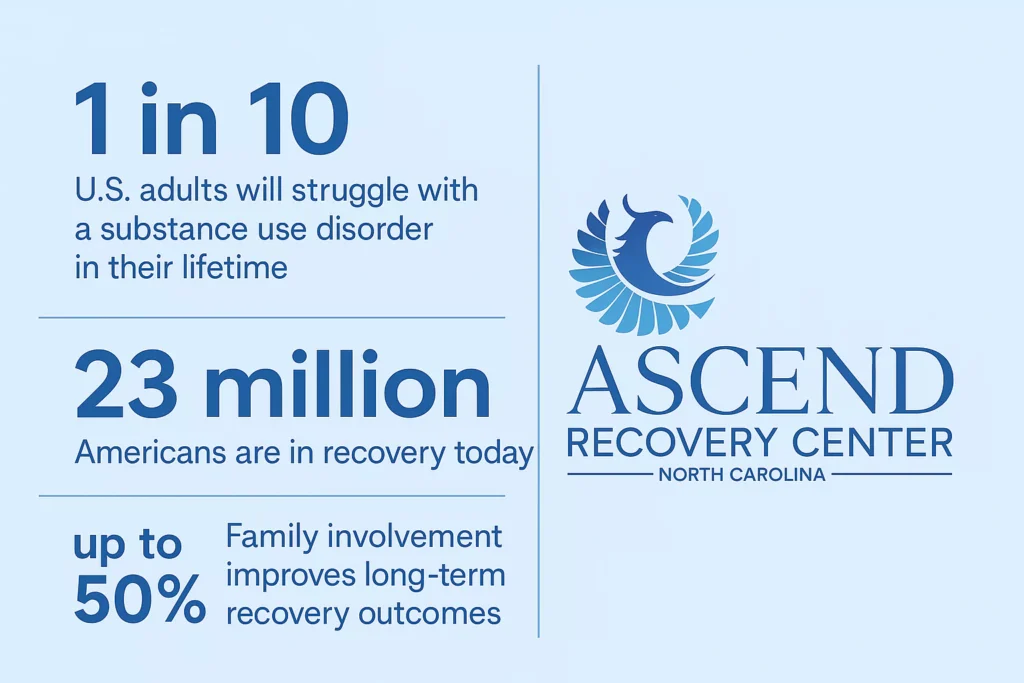Watching your child return to detox—again—can feel like the wind has been knocked out of you. You’ve been through the late-night phone calls, the shaky promises, the moments of hope followed by silence. If you’re here, you’re likely asking yourself: What else can I do?
Here’s the truth: your love still matters. It always has.
If your loved one is entering a medical detox program in North Carolina, your presence, patience, and boundaries will shape their experience more than you realize. And if you’re exhausted? That’s okay too. This guide is here to offer you clarity, not perfection.
What Is a Medical Detox Program—and Why Does It Matter?
Detox is not treatment—it’s the door to it.
A medical detox program is a short-term, medically supervised process that helps individuals safely withdraw from drugs or alcohol. This stage often involves:
- 24/7 monitoring by clinical staff
- Medications to reduce discomfort or risk
- Emotional support and stabilization
At Ascend North Carolina’s Charlotte-based medical detox center, the goal is to help your child clear their body of substances safely and begin the emotional and physical reset needed for real recovery. Think of detox like rebuilding a foundation after a storm—it doesn’t fix the whole house, but it makes everything else possible.
Should I Be Involved During Detox?
This is one of the most common—and emotionally loaded—questions we hear. The short answer? It depends.
Some young adults deeply crave connection during detox. Others need space to sit with themselves. Many are still wrestling with guilt, shame, or ambivalence. The best first step is to ask the clinical team overseeing care.
At Ascend, we help families determine what level of involvement is healthy. That might look like:
- Writing a supportive letter (that staff can read to them)
- Participating in a structured family call or update
- Waiting until post-detox to reconnect with clearer boundaries
Being involved doesn’t mean hovering. It means showing up in a way that helps—not overwhelms—your child.
What Can I Say That Actually Helps?
When your child is in detox—especially after a relapse—they’re often swimming in internal shame. What you say (and don’t say) can cut through that noise or compound it.
Here’s a truth we wish more parents heard: Your child still wants to know you believe in them.
Helpful phrases to consider:
- “I’m proud of you for taking this step.”
- “You’re not alone. I’m here.”
- “I love you—and I’m learning how to care for myself too.”
Phrases that can cause harm (even if well-intended):
- “Are you really going to stick with it this time?”
- “You’ve said this before.”
- “I don’t want to get my hopes up again.”
Your words don’t need to be perfect. But they do need to be rooted in love without strings attached.
How Do I Deal With My Own Emotions?
You’re likely feeling a cocktail of emotions: grief, guilt, relief, fear, exhaustion. That’s normal. Detox isn’t just a process for your child—it stirs up your own wounds too.
You might be asking:
- Did I miss the signs?
- Why didn’t treatment work before?
- How much more of this can I take?
These questions deserve care. Support groups for parents (like Al-Anon or Families Anonymous) or family therapy can help you move from survival mode into steadier ground.
You matter in this process.
And how you take care of yourself will model something powerful for your child—especially in early recovery when they’re relearning what care looks like.

What Happens After Detox?
This is where hope meets reality. Detox is critical—but it’s not enough on its own. Without continued care, the brain and body are still vulnerable to triggers, cravings, and old patterns.
After detox, your child may be recommended to step into:
- Residential treatment for immersive care
- Partial hospitalization programs (PHP) for structure and therapy during the day
- Intensive outpatient programs (IOP) for those needing flexibility with support
At Ascend Recovery Center’s Charlotte facility, we provide a continuum of care. That means your child won’t be sent home unsupported. Our team works with families to build a transition plan that meets their clinical needs and emotional readiness.
What If This Isn’t Their First Time in Detox?
If you’re reading this after multiple treatment attempts, you are likely holding grief that has no clean name. Relapse can feel like betrayal, even though it isn’t. It’s a signal that more healing is needed—not that your child doesn’t care.
Here’s what we know:
- Relapse is common, especially in the first year of recovery.
- Shame often fuels it—not laziness, not failure.
- Many people find long-term recovery after multiple attempts.
Your child may not say it, but your continued love helps stitch their hope back together. Slowly, quietly, powerfully.
How Do I Know If the Program Is Safe and Reputable?
In North Carolina, medical detox programs should be licensed and staffed with qualified professionals—typically including physicians, nurses, and addiction specialists. Look for programs that offer:
- 24/7 medical supervision
- Emotional and psychiatric support
- A transition plan for next steps
- Family involvement (where appropriate)
Ascend North Carolina’s detox program in Charlotte meets these standards and more. We understand that detox is a vulnerable time—for everyone involved.
What If My Child Doesn’t Want Help Anymore?
It’s not uncommon for someone to reconsider detox mid-process. Withdrawal is uncomfortable. Emotions rise. Fear sets in.
Don’t take it as rejection. Take it as a signal they’re struggling.
This is when clinical staff can be most helpful. If this happens at Ascend, we help your child process their resistance with care, not coercion. And we’ll keep you informed in a way that honors everyone’s privacy and safety.
FAQ: Detox Support for Parents
How long does detox usually last?
Most detox programs last 5–7 days, but it depends on the substance, use history, and medical needs. Medical staff may extend care to ensure safe stabilization.
Can I send my child messages or personal items during detox?
Some centers allow letters, calls, or drop-offs at certain points. Always check with the staff first—policies vary to protect safety and treatment integrity.
What happens if my child wants to leave early?
Adults can technically leave against medical advice, but staff will do everything possible to support their safety and reconsideration. Many change their minds with compassionate clinical support.
Will I be updated about my child’s progress?
With your child’s consent, yes. HIPAA laws limit what can be shared without permission—but programs like Ascend help facilitate communication when it supports healing.
What’s the next step after detox?
Your child will likely be assessed for ongoing care—either residential treatment, PHP, or IOP. Our team works closely with families to design the most supportive next phase.
📞 You’re Not Alone—and You’re Not Powerless
Even when you feel like you’ve tried everything, showing up matters. Hope doesn’t have to be loud. Sometimes, it’s as quiet as a ride to treatment or a message that says, “I still believe in you.”
Call (844) 628-9997 or visit our Medical Detox Program page to learn more about how Ascend North Carolina supports families and their loved ones in Charlotte.


